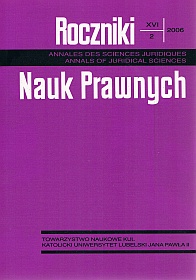Appellation as Envisaged by the Instruction Dignitas Connubii
Abstract
A judicial appellation in its narrow sense is an appellation made by one of the litigants against the judgment passed by the lower court to a higher court, together with a request for re-examination of the case and reversal or change of the unfair judgment. Instruction Dignitas Connubii for nullity of marriage, enacted on 8 February 2005, introduces several solutions for the institution of appellation, non-existent in the older edition of Code of Canonical Law of 1983. It imposes on the defender of the marriage bonds an obligation to lodge an appellation ex officio, when he or she believes that the grounds for the annulment judgment are not sufficient. The Instruction also allows the possibility of verbal declaration of appellation, which a notary public has to put in writing in the presence of the appellant. The Instruction mentions the possibility of the petitioner filing appellations with the Rota. Additionally, one can find a novel option of supporting the appellation via the tribunal in which the litigant appeals. There is also a norm which explicitly states that appellation periods do start running until the litigants are not served a certified copy of the judgment. Finally, one finds in Dignitas Connubii a regulation that has long been indisputable and used by all church tribunals. Namely, it states that a nullity case which has already been settled may not be considered anew for in such a situation the case is apparently settled in accordance with the law. However, this regulation may be used only if the same marriage is considered and the same motives, that is those relating to nullity of marriage.
Copyright (c) 2006 Roczniki Nauk Prawnych

This work is licensed under a Creative Commons Attribution-NonCommercial-NoDerivatives 4.0 International License.


